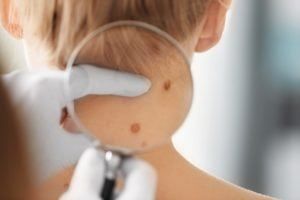
Extensive training in Dermatology residency is required in order to identify suspicious spots, growths and moles that need to be biopsied or removed. Most people are familiar with the Common types of skin cancer such as basal cell carcinoma, squamous cell carcinoma and melanoma. However, there are more rare forms of cancer that are serious and need to be diagnosed such as Merkel cell carcinoma, dermatofibroma sarcoma, and desmoplastic melanoma.
Surgical removal of skin cancer such as basal cell carcinoma, squamous cell carcinoma and melanoma are daily procedures at our office. Dermatologist have the surgical training and equipment to remove these cancerous skin growths in the office with local anesthesia. Dr. Woods and her medical assistants are highly skilled in surgical procedures, and they have removed more than 5000 skin cancers. They take pride in their work, not only finding skin cancer but in removing it in a complete, safe and cosmetic fashion. When Mohs surgery is indicated, they will refer you to highly skilled, board certified colleague in the region.
In addition to skin cancer, it is important to recognize and treat precancerous lesions for prevention. Severely precancerous or dysplastic moles are especially important to find so that they do not turn to melanoma. Actinic keratosis (AK) are another precancerous growth that needs to be managed so they do not turn to squamous cell skin cancer. Methods to remove actinic keratosis include cryotherapy or freezing, topical medicines, and photodynamic therapy. We get excellent results using laser assisted Photodynamic Therapy or PDT. This treatment is covered by most insurances and involves using a light activated topical drug to treat a large area and number of lesions.
The best way to detect skin cancer early is by having a full body skin examination. These are longer scheduled appointments which consist of a thorough examination and documentation of every square inch of the body from toes to scalp. During annual full body examinations or follow-up exams we are able to reference past diagrams to make sure that moles or other lesions have not changed. People with a personal or family history of skin cancer should have these types of exams in order to stay proactive. We also offer a wide selection of the most effective protective sun clothing, SPF 50 hats, sunscreens, and a DNA repair cream.





